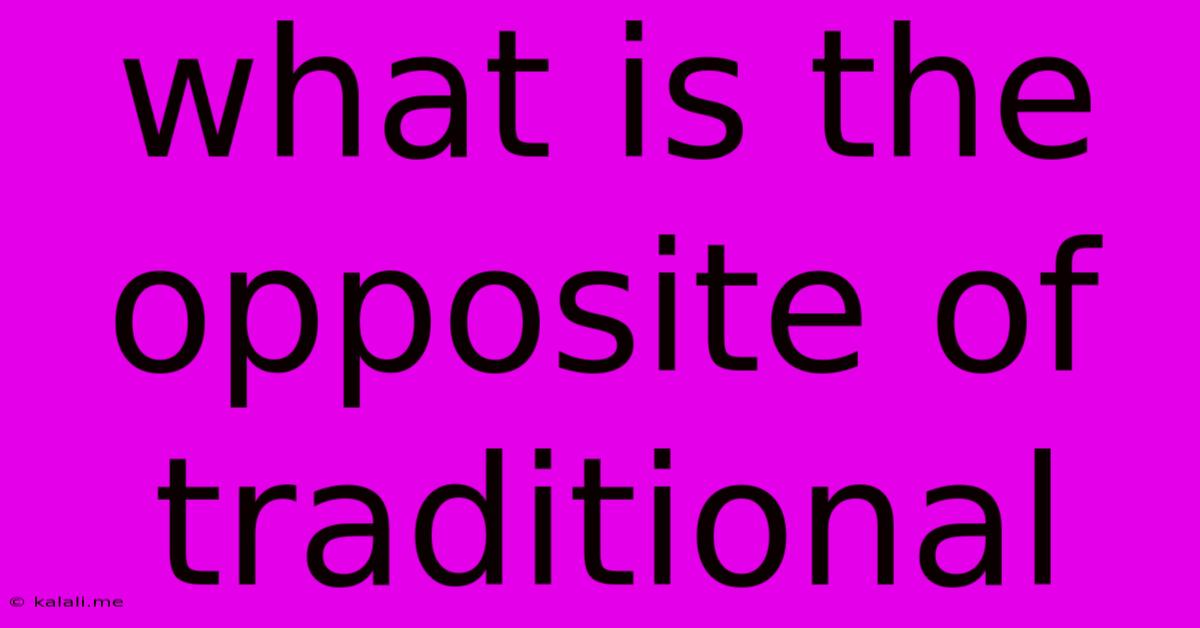What Is The Opposite Of Traditional
Kalali
Jun 13, 2025 · 3 min read

Table of Contents
What is the Opposite of Traditional? Exploring the Spectrum of Modernity
The term "traditional" evokes images of established customs, inherited practices, and time-honored methods. But what exactly is the opposite of traditional? It's not a simple binary; the answer depends heavily on the context. This article explores the spectrum of "non-traditional," examining various antonyms and the nuances they represent. Understanding this spectrum is crucial for anyone aiming to innovate, challenge conventions, or simply appreciate the evolution of culture and practice.
Understanding "Traditional" in Different Contexts:
Before diving into opposites, let's clarify the meaning of "traditional." "Traditional" implies adherence to long-standing norms, beliefs, or practices within a specific culture, society, or field. This can relate to:
- Cultural Traditions: Think of established rituals, ceremonies, art forms, and social behaviors passed down through generations. Examples include specific clothing styles, culinary practices, or religious observances.
- Business Practices: This refers to established methods of operation, management styles, and marketing approaches. Traditional business models might contrast with modern agile methodologies or digital marketing strategies.
- Educational Approaches: Traditional education often involves structured classrooms, lectures, and standardized testing, differing from alternative approaches like homeschooling, unschooling, or project-based learning.
- Artistic Styles: Traditional art styles follow established techniques, aesthetics, and subject matter, contrasted with modern or contemporary movements that challenge these norms.
Antonyms and Nuances of "Non-Traditional":
Several words capture aspects of the opposite of "traditional," each with its own implications:
-
Modern: This is perhaps the most common antonym. "Modern" emphasizes contemporary trends, technologies, and ideologies. It often suggests innovation and a break from established norms. However, "modern" itself evolves over time, meaning what's considered "modern" today may be "traditional" in the future.
-
Contemporary: Similar to "modern," "contemporary" highlights current trends and styles. It often suggests a more immediate relevance and a conscious departure from the past.
-
Avant-garde: This term signifies a radical departure from established norms, pushing creative boundaries and challenging societal expectations. It implies a strong element of experimentation and innovation.
-
Progressive: This antonym indicates a forward-thinking approach, embracing change and improvement. It often implies a focus on social justice and societal advancement.
-
Innovative: This highlights the focus on new ideas, methods, and technologies. It emphasizes creativity and problem-solving in developing novel solutions.
-
Revolutionary: This suggests a complete and fundamental overthrow of traditional systems and beliefs, often implying significant social or political upheaval.
The Spectrum of Modernity:
It's important to understand that the opposition to "traditional" isn't always a clear-cut dichotomy. There's a spectrum, ranging from subtle modifications of traditional practices to a complete rejection of established norms. Some approaches might selectively integrate elements of both traditional and modern approaches, creating hybrid forms. For example, a contemporary artist might incorporate traditional techniques while exploring new themes and mediums.
Conclusion:
The opposite of "traditional" is not a single word but a spectrum of concepts, each with its own nuances and implications. Understanding this spectrum is crucial for navigating the dynamic interplay between established practices and emerging trends across various aspects of life. Whether you're an artist, entrepreneur, educator, or simply a curious individual, recognizing this spectrum empowers you to critically engage with cultural evolution and the ever-shifting landscape of modernity.
Latest Posts
Latest Posts
-
Match The Defense Mechanism With The Characteristic
Jun 14, 2025
-
Which Of The Following Is Not A Characteristic Of Enzymes
Jun 14, 2025
-
A Graphics Tablet Is Also Called A Digitizing Tablet
Jun 14, 2025
-
The Cognitive Domain Involves Learning Through
Jun 14, 2025
-
Classical And Operant Conditioning Are Forms Of
Jun 14, 2025
Related Post
Thank you for visiting our website which covers about What Is The Opposite Of Traditional . We hope the information provided has been useful to you. Feel free to contact us if you have any questions or need further assistance. See you next time and don't miss to bookmark.